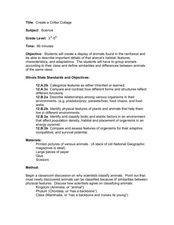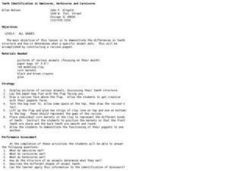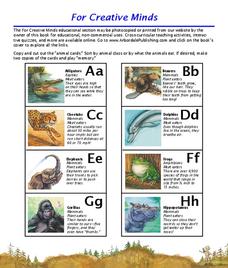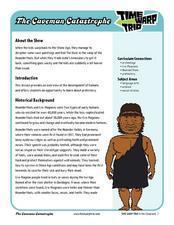Curated OER
Skulls Tell It All
Skulls tell it all, and with this lesson plan, you will tell it all to your class! Youngsters view animal skulls, analyzing the shape of teeth and the placement of the eye sockets. They associate these adaptations with the types of food...
Curated OER
Be Kind to Your Teeth
What kinds of food can be bad for your teeth? Kindergartners and first graders explore dental health with an interactive science inquiry. Given a choice of foods such as celery, cake, and milk, kids choose which ones are better for their...
Curated OER
Fossil Kit I - Lesson Plan
Here is a 14-page lesson plan that deftly outlines a wonderful educational experience for your youngsters. In it, students learn about a variety of animals that have left behind clues of their existence in fossil form. Many excellent...
Curated OER
Teeth and Eating
Students conduct online research of different animals and their diet. In this animal lesson, students identify the various types of diets each animals has and their teeth. This research is done on the Internet.
Curated OER
Teeth and Eating
Students examine pictures of different animals and decide if they eat meat and/or plants. They inspect models of pairs of upper and lower teeth and discuss which teeth are most useful for cutting grass and tearing meat.
Curated OER
Create a Critter Collage
Young scholars create a collage. In this animal classification instructional activity, students discuss why and how scientists classify animals. Young scholars view pictures of different animals and decide which class each animal belongs...
Curated OER
ESL Animal Word Matching
In this ESL animal word matching worksheet, students look 10 blackline pictures of animals. They match the picture with the word that names the animal such as a rabbit, a snake, a dog, or a lion.
Curated OER
ESL Animal Name Matching Worksheet
In this ESL animal name matching worksheet, students match 10 small clip art pictures of animals with their names. They match animal names such as a dog, a snake, a giraffe, and a butterfly.
Science Geek
The Mole
What can you call a tooth in a glass of water? A one-molar solution! Presentation covers moles, Avogadro's Number, calculating formula mass, converting moles to grams, converting grams to moles, and calculations with moles. It is the...
Curated OER
Eukaryotic Animal Cell, Candy Cell Model: Science
Students review the parts of the eukaryotic animal cell and construct a model using various types of candy.
Curated OER
Animal Classification
Students are introduced to the concept of classification as it relates to objects, information, and characteristics. In this classification lesson, students research a variety of animals. Students study the Linnaeus's system of...
Curated OER
Teeth Identification in Omnivores, Herbivores and Carnivores
Students practice identifying teeth. For this biology lesson plan, students explore the differences in teeth structure and how it determines what a specific animal eats by constructing a raccoon puppet.
Curated OER
Plankton in the Air
Here is a lab activity adequate for use with any full lesson on environmental factors that shape animal adaptations or marine animal characteristics. Pupils will discuss the role plankton plays in the environment and filter-feeding...
Curated OER
Animal Similes
In this ESL animal vocabulary instructional activity, students examine pictures of 7 animals. Students read similes that are incomplete; the animal names will be used to make the simile complete. Example: as blind as a (bat).
Curated OER
ESL Farm Animal Words
In this ESL farm animal words matching learning exercise, students examine 5 clip art pictures of farm animals. They match the picture on the left with the word that names it on the right.
Curated OER
What Do We Learn From Fossils?
Students investigate what a fossil is and how it came to be. In this fossil lesson, students examine pictures of skeletons and identify characteristics that can and cannot be determined by a fossil. Students complete diagrams of a...
Curated OER
Ocean Exploration
Students explore whales. In this animal adaptation and whale lesson, students access prior knowledge about whales from previous lessons, then use background knowledge to predict the eating strategies of a baleen whale and a toothed...
Curated OER
The Real Tooth Fairy
First graders listen to the story "The Real Tooth Fairy and explore the concept of mental images. In this mental image lesson, 1st graders create a mental image of what the tooth fairy looks like. Students listen to the teacher model...
Curated OER
Lesson 1 - What Are Fossils?
Students define and research fossils. In this fossil lesson plan, students access teacher assigned Internet sites to examine images of fossils. They determine the definition of a fossil and find out how fossils are formed. They also...
Curated OER
Teeth and Eating
Students explore animal diets and teeth. In this animal science lesson plan, students view photos of animals and their teeth. Students identify the type of diet the animal has based on the teeth. Students are introduced to the terms...
American Museum of Natural History
Moving Mammals
How many different ways do mammals move from place to place? An online resource uses animation to show how different mammals move. Learners use a slider to speed up or slow down a variety of mammals. The versatile lesson works as a...
American Museum of Natural History
What's This? Leeches
Who actually likes leeches? Meet a scientist that makes his living letting leeches feed on him. Pupils learn about the characteristics of leeches and different variations of the species. The lesson works as a remote learning resource or...
Curated OER
ABC Safari
Students study the animals and their alphabet letter. In this animal alphabet lesson, students associate the animals with their letter and learn facts about the animals. Students may use the cards to classify animals by groups or play a...
Time Warp Trio
The Caveman Catastrophe
Young archaeologists study the development of human history, and work in groups to create a timeline that traces the development of humans. Additionally, the groups utilize a very clever graphic organizer embedded in the plan in order to...

























